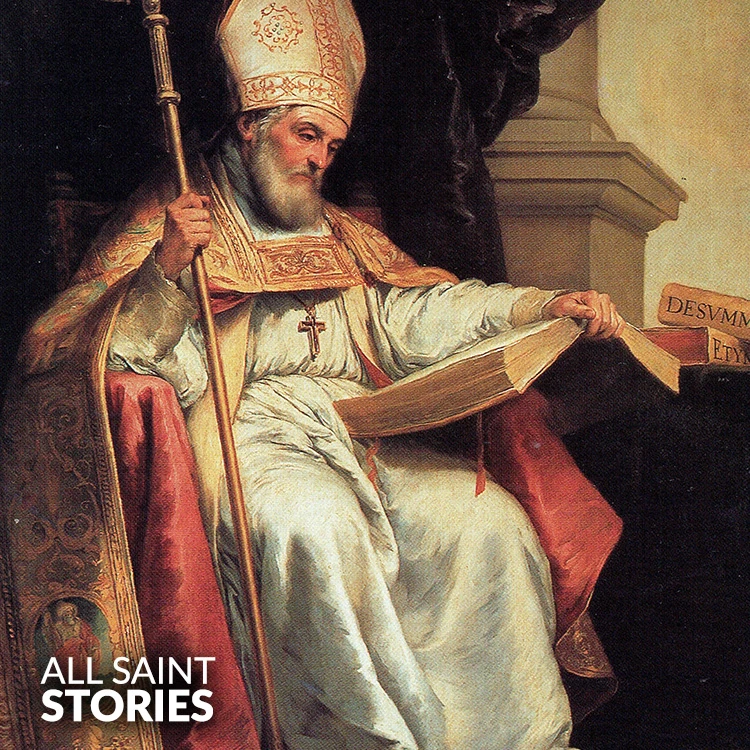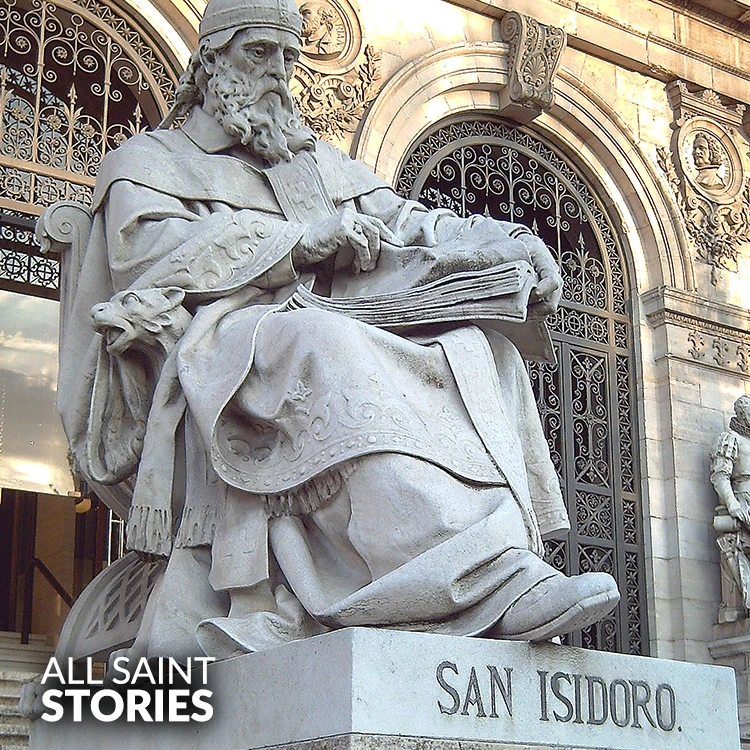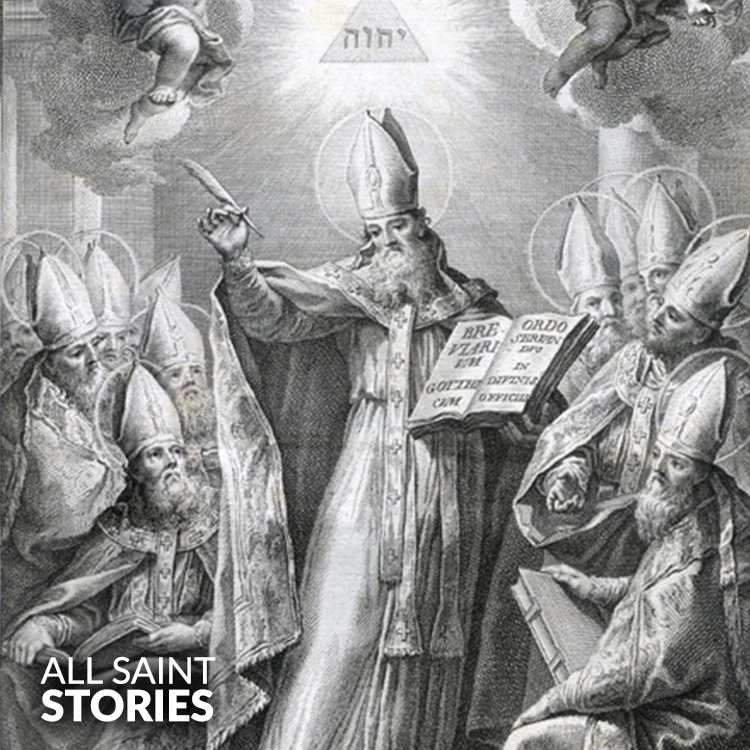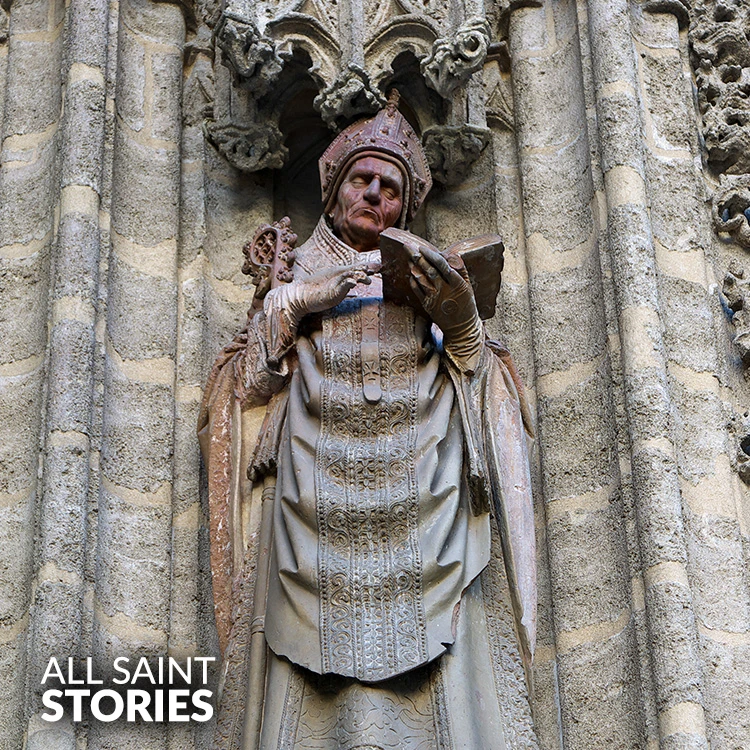O God, who didst give blessed Isidore to thy people as a bishop able to teach and to guide, grant, we beseech thee, that we may always profit by his wisdom and walk in the truth he taught. Through Christ our Lord. Amen.
ST. ISIDORE OF SERVILLE
ST. ISIDORE OF SERVILLE

St. Isidore of Seville was a 6th–7th-century archbishop, scholar, and encyclopedist in Spain. Renowned for preserving classical knowledge and promoting education, he authored the Etymologiae, a vast encyclopedia of ancient learning. His efforts helped shape medieval education and Christian scholarship.
St. Isidore of Seville was born around the year 560 in Cartagena, Hispania, during a period of great cultural and political upheaval. As the Roman Empire had long fallen, Hispania was under Visigothic rule, a time marked by a deep divide between Arianism—a Christian heresy followed by the Visigothic rulers—and Nicene Christianity, which was practiced by the majority of the Romanized populace. Isidore was born into a highly influential and devoutly Christian family. His elder brother Leander served as Archbishop of Seville before him, and his other siblings, Fulgentius and Florentina, were also canonized saints. This spiritually rich environment deeply influenced Isidore's intellectual and religious development.
After the death of his brother Leander, Isidore succeeded him as Archbishop of Seville around 600 AD. As archbishop, he dedicated himself to the spiritual, educational, and administrative reform of the church and society. One of his greatest accomplishments was his instrumental role in the conversion of the Visigothic rulers from Arianism to orthodox Christianity, helping to unify religious practice and foster greater social cohesion in Hispania.
St. Isidore's most famous and enduring contribution to Western civilization is his encyclopedic work, the Etymologiae (also known as Origines), which attempted to compile and preserve all the knowledge of the classical world. Organized into twenty books, this monumental work covered a wide range of topics, including grammar, rhetoric, mathematics, medicine, law, history, theology, and the natural world. The Etymologiae was widely read and used as a reference throughout the Middle Ages and was one of the most influential books of its time. It functioned much like a database, collecting and categorizing knowledge, making it accessible to scholars, clergy, and students during a time when much of the classical heritage risked being lost.
In addition to his scholarly achievements, Isidore was a vigorous church reformer. He presided over the Fourth Council of Toledo in 633, where significant decisions were made regarding church discipline, education, and the relationship between church and state. He advocated for the establishment of cathedral schools in every diocese, emphasizing the need for a well-educated clergy and laity. This emphasis on learning and education set the foundations for future educational institutions in medieval Europe.
Despite his scholarly and administrative demands, Isidore maintained a strong pastoral presence, caring deeply for his people and guiding them in the faith. He was known for his humility, wisdom, and compassion. His efforts helped create a more cohesive and learned Christian community that could better resist both internal divisions and external threats.
St. Isidore died on April 4, 636, in Seville, and was buried in the city's cathedral. His legacy endured through the centuries, particularly during the Carolingian Renaissance, when his works were rediscovered and studied anew. In modern times, due to his encyclopedic efforts to gather and preserve knowledge, he has been proposed as the patron saint of the Internet and computer users, symbolizing the dissemination and accessibility of information.
Though the precise date of his canonization is unknown, it occurred long before the formal canonization process was established by the Catholic Church, which classifies him as being canonized "Pre-Congregation." His feast day is celebrated on April 4 each year. St. Isidore of Seville remains a powerful symbol of intellectual and spiritual unity, bridging the classical and medieval worlds with his writings and reforms.
Video Not Found
The information on this website is compiled from various trusted sources. While we aim for accuracy, some details may be incomplete or contain discrepancies.
If you notice any errors or have additional information about this saint, please use the form on the left to share your suggestions. Your input helps us improve and maintain reliable content for everyone.
All submissions are reviewed carefully, and your personal details will remain confidential. Thank you for contributing to the accuracy and value of this resource.
Credits & Acknowledgments
- Anudina Visudhar (Malayalam) – Life of Saints for Everyday
by Msgr. Thomas Moothedan, M.A., D.D. - Saint Companions for Each Day
by A. J. M. Mausolfe & J. K. Mausolfe - US Catholic (Faith in Real Life) – Informational articles
- Wikipedia – General reference content and images
- Anastpaul.com – Saint images and reflections
- Pravachaka Sabdam (Malayalam) – Saint-related content and insights
We sincerely thank these authors and platforms for their valuable contributions. If we have unintentionally missed any attribution, please notify us, and we will make the correction promptly.
If you have any suggestion about ST. ISIDORE OF SERVILLE
Your suggestion will help improve the information about this saint. Your details will not be disclosed anywhere.
© 2026 Copyright @ www.allsaintstories.com





 English
English
 Italian
Italian
 French
French
 Spanish
Spanish
 Malayalam
Malayalam
 Russian
Russian
 Korean
Korean
 Sinhala
Sinhala
 Japanese
Japanese
 Arabic
Arabic
 Portuguese
Portuguese
 Bantu
Bantu
 Greek
Greek
 German
German
 Dutch
Dutch
 Filipino
Filipino